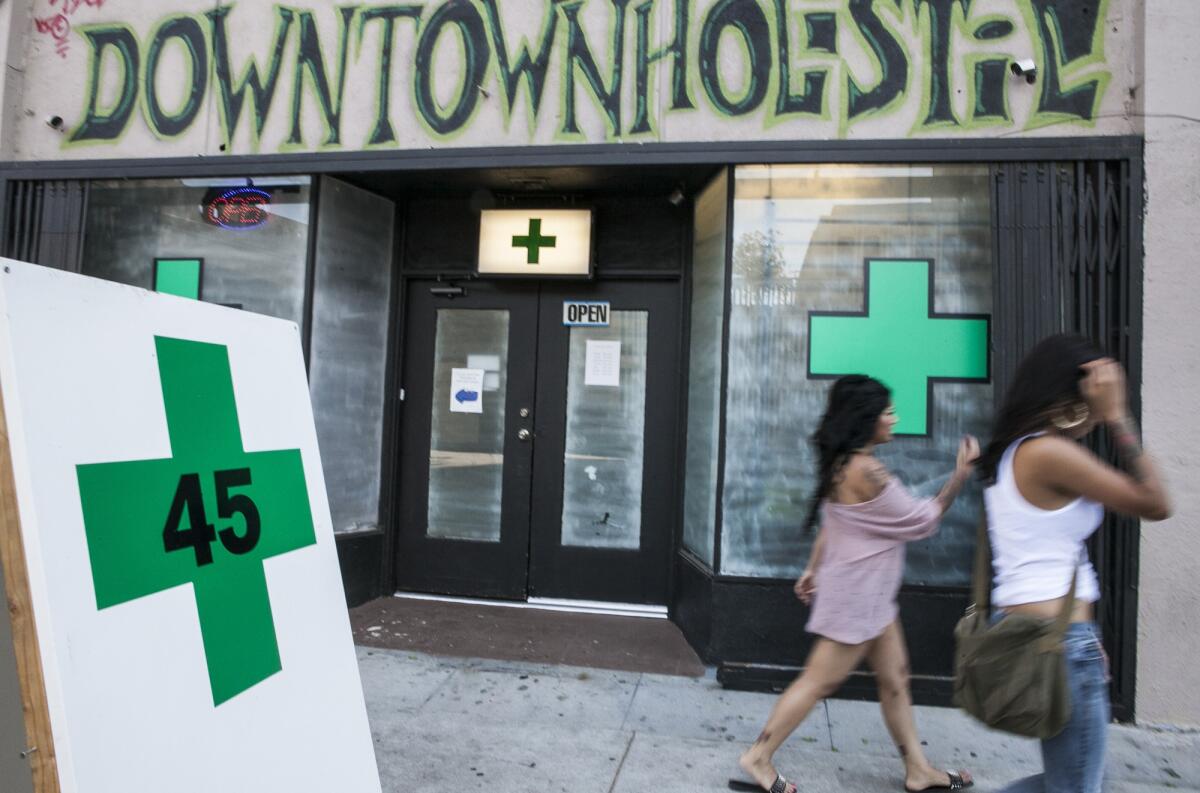L.A. lawmakers question tax renewals for medical marijuana shops

- Share via
Last year, Los Angeles voters sought to clamp down on medical marijuana shops, approving a host of restrictions that were expected to forcefully winnow down the number of such businesses.
Yet as the city tried to shutter hundreds of pot shops, one arm of government kept registering new ones.
Earlier this year, more than 450 medical marijuana shops filed renewals to pay business taxes with the Office of Finance -- more than three times as many stores than what is estimated to be allowed to stay open under Proposition D.
Even more -- 972 shops -- remain actively registered with the city, according to officials.
Finance officials said they cannot assess whether a business is legal before handing out a registration certificate under city restrictions. Los Angeles collected roughly $2.1 million from medical marijuana tax renewals this year, an Office of Finance staffer told a City Council committee Monday.
The phenomenon troubles some local lawmakers, who are pushing for the city to examine whether it can limit or halt new business tax registration certificates for medical marijuana shops that don’t meet Proposition D requirements. Puzzled by the situation, Councilman Mike Bonin asked whether someone trying to sell whale meat, Cuban cigars or heroin could register to pay business tax in Los Angeles.
“It would raise a few eyebrows on our part,” Office of Finance staffer Robert Lee told the committee, saying that their office might go talk to city lawyers about it. In general, however, finance officials cannot look at the legality of the businesses it registers, Lee said.
Councilman Paul Krekorian quipped that it was “the opposite of the Al Capone situation,” because businesses were operating illegally, but avoiding the charge of tax evasion. He urged city finance officials to proactively share the list of registered pot shops with the police department and other city agencies.
Under Proposition D, medical marijuana businesses and the landlords who lease to them can be prosecuted if the shops don’t meet several requirements, including being registered under past ordinances and operating an adequate distance from public parks, schools and other facilities. City officials estimate that fewer than 140 such businesses are eligible to keep operating under the law.
With hundreds more shops registered than are allowed under the city ordinance, “we have a significant disconnect,” Krekorian said.
City Atty. Mike Feuer has stressed that the tax registration certificates are not a permit allowing medical marijuana shops to operate. To make that clearer, Los Angeles Police Department Capt. Anne Clark said language stating that the registration does not legally authorize a business has been moved from the back to the front of the certificates.
Sarah Armstrong of the Greater Los Angeles Collective Alliance, which supported Proposition D, said her group was very worried about a “tsunami” of illegal shops continuing to open. She added that lawful medical marijuana businesses have fallen victim to “corporate identity theft” stemming from the tax registrations, complaining that even “my cat” could get or alter a business tax registration certificate.
“This needs to be rectified,” Armstrong said.
In the push to tighten the noose on illegal pot shops, a Council committee asked Monday for more information on where existing medical marijuana businesses are located, suggesting that the city might be able to “crowdsource” information from Los Angeles residents using its 311 app.
Council members also want to explore whether medical marijuana taxes or some kind of enforcement fines could be used to boost funding for prosecutors to shut down unallowed shops. The committee also voted for the finance office to report back on the possibility of limiting or halting tax registration certificates for medical marijuana businesses in the future.
Follow @latimesemily for what’s happening at Los Angeles City Hall
More to Read
Sign up for Essential California
The most important California stories and recommendations in your inbox every morning.
You may occasionally receive promotional content from the Los Angeles Times.














